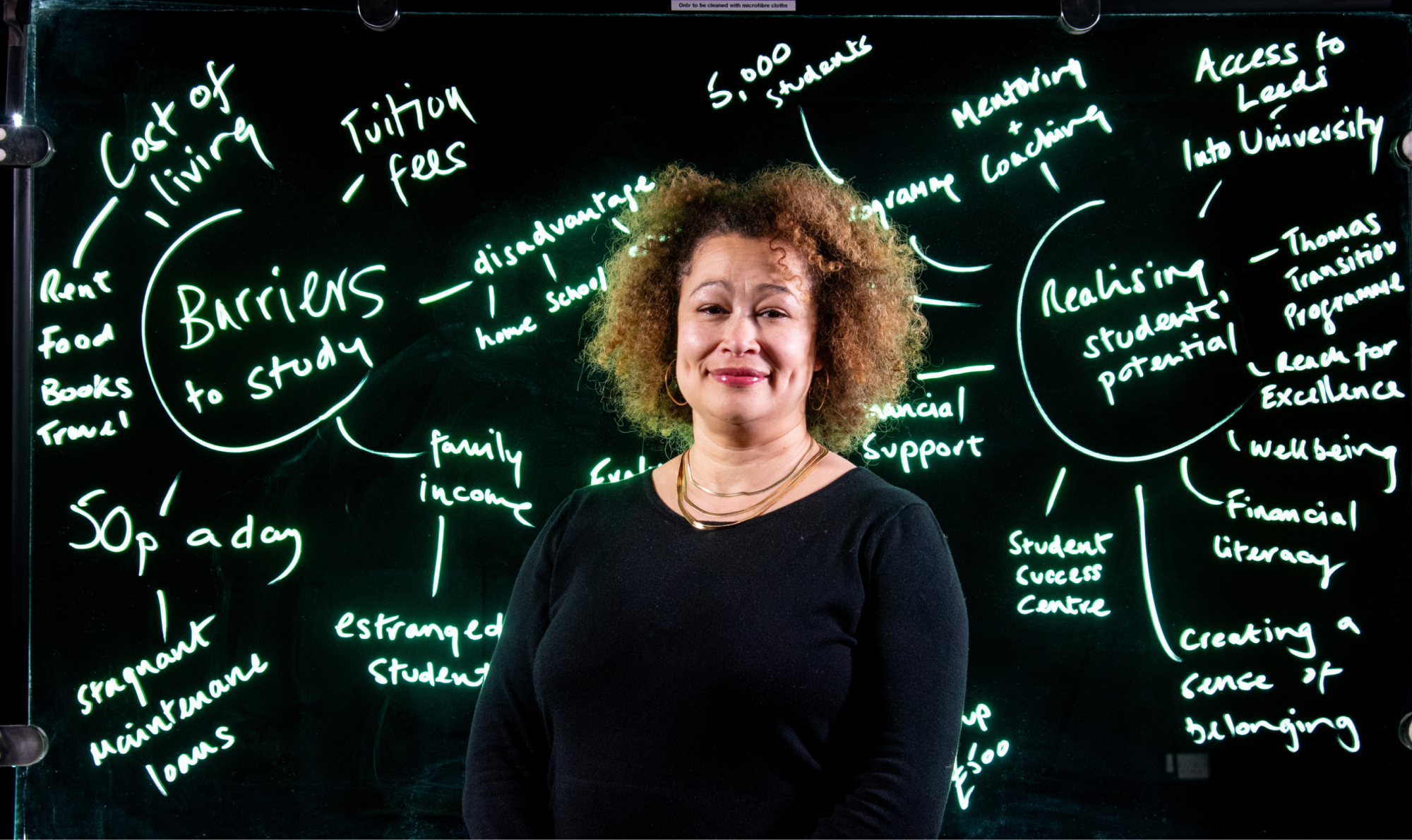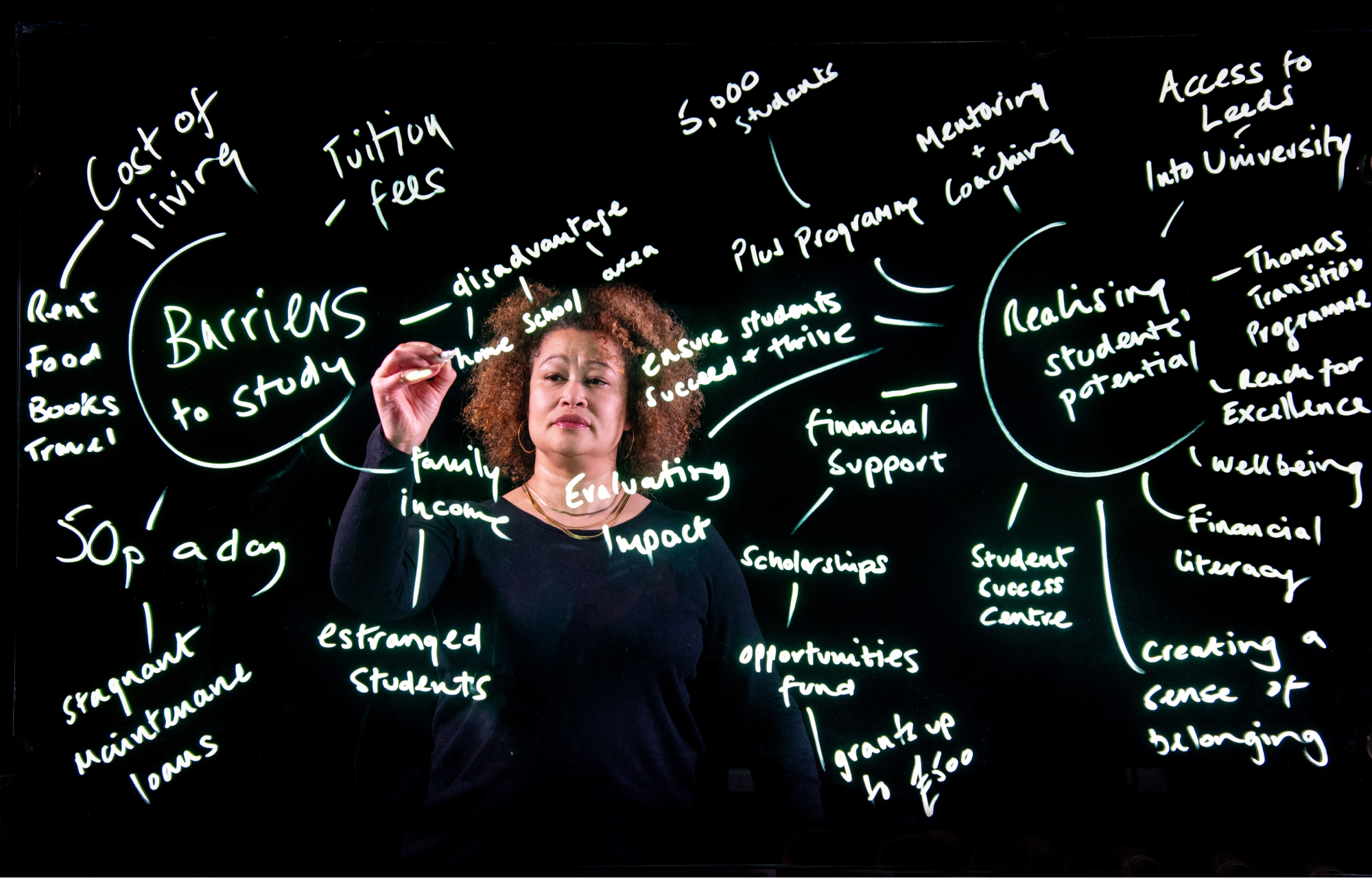EASING THE PRESSURE

Louise Banahene MBE, Director of Educational Engagement and Student Success, explains how you are helping the University to support those students most in need.
What impact is the rising cost of living having on our students?
Over the last few years, rising costs have hit students hard, and clearly this affects some more than others.
It’s hard to overstate the disadvantages some students face, whether it’s their background, financial situation, relationships with family, caring responsibilities or their mental and physical health. Add to this the pressures of high inflation and you have an almost perfect storm of inequality.
As prices have soared, government funding has remained largely static and maintenance loans are now totally insufficient to meet many students’ needs. Those without family networks or with caring responsibilities face real financial hardship. It affects their diet and mental health and limits the choices they can make.
Does this impact on their studies?
For these students in particular, it has a direct impact. For many years, part-time work has been a part of university life for lots of students. But now, some are working more and more hours just to get by and continuously juggling conflicting demands on their time.
We also have students from widening participation backgrounds who live at home while studying and they’re struggling because of rising transport costs.
Do these pressures mean that students are missing out, in relation to their peers?
Absolutely. By enrolling at Leeds students enter a world of opportunities. Whether it’s clubs and societies, volunteering, academic research, work placements or study abroad, these enrich a student’s experience and contribute to their success, employability and long-term prospects. They can be life-changing. But for some – ironically those who might benefit most – financial imperatives, and the need to balance study with caring responsibilities or work, can prevent them taking part. Some students overcome significant obstacles to reach Leeds, and as a community we must give them the best possible chance to succeed.
The Opportunities Fund supports students from low-income households to participate in clubs and societies or cover the cost of attending interviews. We’ve also worked with students to develop flexible opportunities such as virtual work placements and shorter periods of study abroad.
Gifts to the Plus Programme and Opportunities Fund ensure that someone’s limited funds don’t preclude them from immersing themselves in the richest possible University experience.
How does the University help students deal with their financial issues?
We’ve been working with Leeds University Union to offer free breakfasts and open a new cafe to meet students’ most basic needs. Demand is high; students who come along have also welcomed the opportunity to talk to our team who can help them develop their financial literacy. We’ve seen the impact of this particularly amongst students who have never had to manage a budget before. We want to expand this to reach more students and engage them earlier.
We’ve also worked with the most vulnerable groups including those who have experienced care and students estranged from their families. Both groups face the added pressure of having no family home to return to. Not only does this foster a sense of isolation, but it also heaps upon them a further financial burden when they face accommodation and living expenses outside term time. I’m proud of the work we’ve done to offer extra support for these groups in the holidays. Alongside this, a programme of engagement reminds students that they aren’t alone.
We know this work has a positive impact, and we’re keen to develop it further and to include more students, such as those with caring responsibilities. This is emblematic of our approach. By working closely with students and understanding their needs and experiences, we can identify those most vulnerable – and develop interventions which work best for them.
Have prospective students started turning away from university due to the cost of living?
If as a prospective student all you see is the cost and the level of debt you face – and you have little family experience of higher education – you might easily be deterred from applying. So one of my team’s big areas of focus is ensuring that the benefits of a university education are properly communicated, particularly to those from under-represented backgrounds. Whether you’re still in school or have had a break from education, we don’t want your financial circumstances to be a barrier to accessing the University of Leeds.
That’s where our engagement work in schools and communities is so important: from our IntoUniversity centres, the Thomas Transition Programme and Reach for Excellence – all of which are supported by our donors – to our contextual admissions scheme, Access to Leeds and our Foundation Years.

Is there a risk that the cost of living could reduce diversity and inclusion on campus?
One of the great things about Leeds is our diverse student body, and we’ve done a great deal of work over many years to ensure our doors are open to all students with the ability to study here, whatever their background. This diverse student community brings different experiences and perspectives valuable for learning in the classroom and working in the graduate market.
Financial support has been the bedrock of that for decades by addressing a clear barrier to diversity. Our scholarship programme, supported through the generosity of our donors, has enabled thousands of students from less advantaged backgrounds, to not only remain on course in their studies but to thrive and succeed.
The balance of financial and non-financial support that we offer means that most of our scholars, despite facing sometimes very challenging lived experiences, achieve a degree in line with their peers and can go on to pursue a fulfilling career.
What message would you give to our donors?
We could not have done any of this without your amazing support. You fulfill a crucial role in enabling us to respond to those in need.